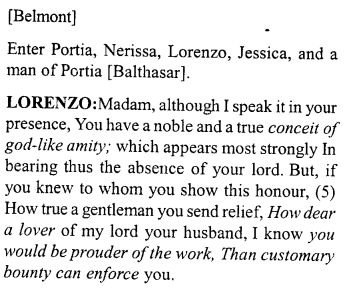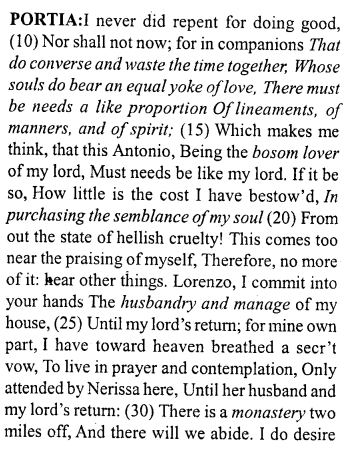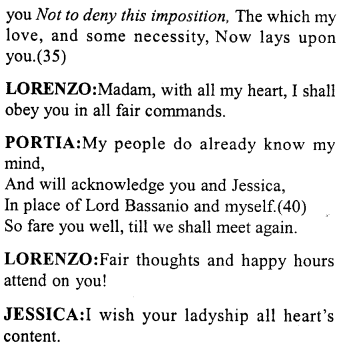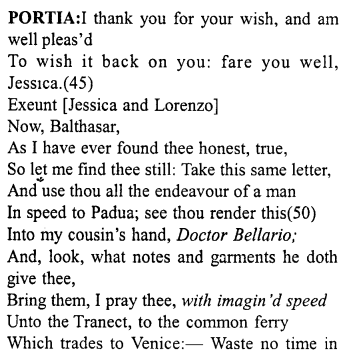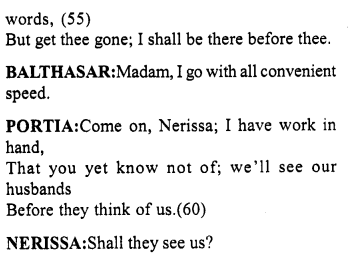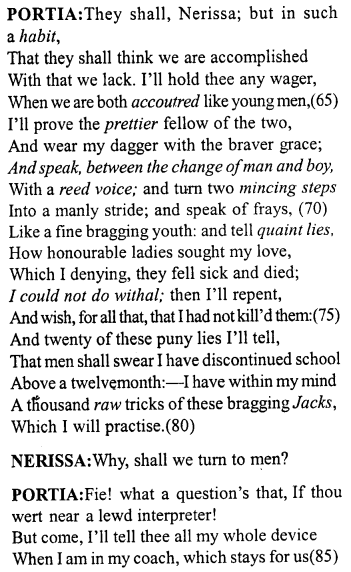Merchant of Venice Workbook Answers Act 3, Scene 5 – ICSE Class 10 & 9 English
ICSE SolutionsSelina ICSE SolutionsML Aggarwal Solutions
EnglishMathsPhysicsChemistryBiology
Passage – 1 (Act III, Sc.V, Lines 45-55)
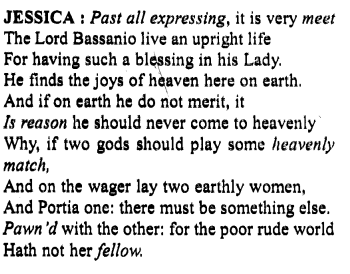
Paraphrase :
JESSICA : So much I can’t express it. It is very proper The Lord Bassanio live an upright life, Because, having such a blessing in his lady, He finds the joys of heaven here on earth; And if he doesn’t merit it on earth, It stands to reason he should never enter heaven. Why, if two gods should play some heavenly match, And place a bet on two earthly women, And Portia is one of them, there must be something else To bet on with the other, because the poor rude world Does not have her equal.
Word Meaning With Annotation
Past all expressing : more than words can express, meet : proper, is reasion : one might reasonally expect, heavenly match : a competition between heavenly or divine beings, pawn’d : put up as a stake; wagered by the other of the two competitors, fellow : equal or match.
Read the above passage and answer the following questions
Question 1.
Who is the speaker of these words? To whom are these words addressed? What is the occasion?
Answer:
Jessica is the speaker of these words. She is talking to her husband, Lorenzo. The two are staying in Belmont in Portia’s house. Portia and Bassanio are away to Venice. Lorenzo just asks his wife to say how she likes Bassanio’s wife. To this Jessica gives the reply in these lines.
Question 2.
What is described as “Past expressing”?
Answer:
According to Jessica, she likes Portia (Bassanio’s wife) very much. She lacks words to express her appreciation for Portia. We have known Portia’s charm and sweetness from the way she treated people. This praise from Jessica to whom Portia must have been very courteous and obliging, still further enriches our conception-of her character.
Question 3.
What kind of life should lord Bassanio lead? What are the reasons to form this expectation?
Answer:
Jessica says that Bassanio who has the good fortune of getting such a noble wife, should live a morally upright life, for she has got through her all the joys of heaven on earth. Perhaps it is a hint that Bassanio’s life in the past has not been up to the mark. He has been indulging in frivolities.
Question 4.
On what condition will he lose the right to enter heaven?
Answer:
Jessica gives her argument that if by not living uprightly Bassanio does not appreciate this heaven on earth, then after death he will have no right to come to heaven above. This passage means that if Bassanio on earth in the sweet company of Portia does not merit the joys of heaven by leading a pure life and make Portia happy, then even in heaven he should not expect any happiness.
Question 5.
Explain what is indicated in the comparison of two gods who “play some heavenly match”.
Answer:
Jessica poetically explains that she wants to impress upon Lorenzo. She says that if two gods should enter into a competition and two earthly women be on stake, it will create a difficult situation if Portia was to be one of them. It will be impossible to find another women to match Portia. Something else will have to be added to the other woman to make her equal to Portia. Jessica is all praise for Portia, whom she considers incomparable.
Question 6.
Does the other person claim something humorously? Is his claim accepted?
Answer:
It is then that Lorenzo humorously points out that just as Portia is a matchless wife, similarly. Lorehzo is a matchless husband to Jessica. Jessica banteringly contradicts him. She pretends to be dissatisfied with his way. Thus, there is a comic touch about his non-serious domestic quarrel between newly-married man and wife.
For More Resources
